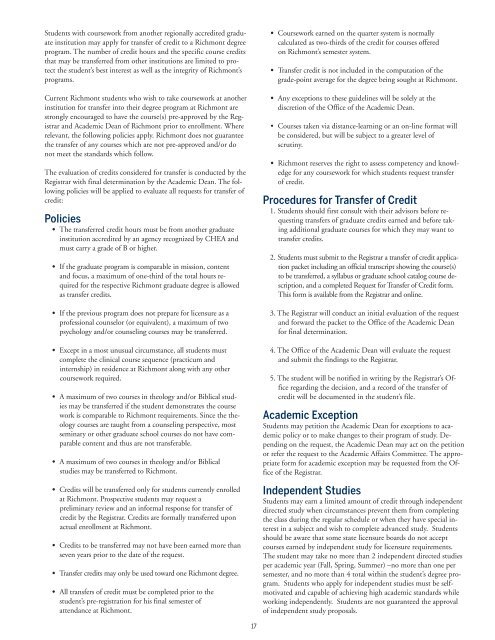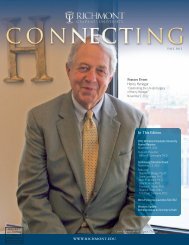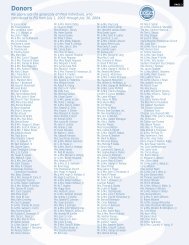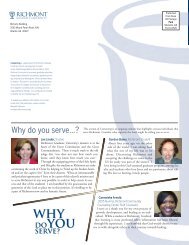Graduate Catalog 2010-2012 - Richmont Graduate University
Graduate Catalog 2010-2012 - Richmont Graduate University
Graduate Catalog 2010-2012 - Richmont Graduate University
You also want an ePaper? Increase the reach of your titles
YUMPU automatically turns print PDFs into web optimized ePapers that Google loves.
Students with coursework from another regionally accredited graduate<br />
institution may apply for transfer of credit to a <strong>Richmont</strong> degree<br />
program. The number of credit hours and the specific course credits<br />
that may be transferred from other institutions are limited to protect<br />
the student’s best interest as well as the integrity of <strong>Richmont</strong>’s<br />
programs.<br />
Current <strong>Richmont</strong> students who wish to take coursework at another<br />
institution for transfer into their degree program at <strong>Richmont</strong> are<br />
strongly encouraged to have the course(s) pre-approved by the Registrar<br />
and Academic Dean of <strong>Richmont</strong> prior to enrollment. Where<br />
relevant, the following policies apply. <strong>Richmont</strong> does not guarantee<br />
the transfer of any courses which are not pre-approved and/or do<br />
not meet the standards which follow.<br />
The evaluation of credits considered for transfer is conducted by the<br />
Registrar with final determination by the Academic Dean. The following<br />
policies will be applied to evaluate all requests for transfer of<br />
credit:<br />
Policies<br />
• The transferred credit hours must be from another graduate<br />
institution accredited by an agency recognized by CHEA and<br />
must carry a grade of B or higher.<br />
• If the graduate program is comparable in mission, content<br />
and focus, a maximum of one-third of the total hours required<br />
for the respective <strong>Richmont</strong> graduate degree is allowed<br />
as transfer credits.<br />
• If the previous program does not prepare for licensure as a<br />
professional counselor (or equivalent), a maximum of two<br />
psychology and/or counseling courses may be transferred.<br />
• Except in a most unusual circumstance, all students must<br />
complete the clinical course sequence (practicum and<br />
internship) in residence at <strong>Richmont</strong> along with any other<br />
coursework required.<br />
• A maximum of two courses in theology and/or Biblical studies<br />
may be transferred if the student demonstrates the course<br />
work is comparable to <strong>Richmont</strong> requirements. Since the theology<br />
courses are taught from a counseling perspective, most<br />
seminary or other graduate school courses do not have comparable<br />
content and thus are not transferable.<br />
• A maximum of two courses in theology and/or Biblical<br />
studies may be transferred to <strong>Richmont</strong>.<br />
• Credits will be transferred only for students currently enrolled<br />
at <strong>Richmont</strong>. Prospective students may request a<br />
preliminary review and an informal response for transfer of<br />
credit by the Registrar. Credits are formally transferred upon<br />
actual enrollment at <strong>Richmont</strong>.<br />
• Credits to be transferred may not have been earned more than<br />
seven years prior to the date of the request.<br />
• Transfer credits may only be used toward one <strong>Richmont</strong> degree.<br />
• All transfers of credit must be completed prior to the<br />
student’s pre-registration for his final semester of<br />
attendance at <strong>Richmont</strong>.<br />
• Coursework earned on the quarter system is normally<br />
calculated as two-thirds of the credit for courses offered<br />
on <strong>Richmont</strong>’s semester system.<br />
• Transfer credit is not included in the computation of the<br />
grade-point average for the degree being sought at <strong>Richmont</strong>.<br />
• Any exceptions to these guidelines will be solely at the<br />
discretion of the Office of the Academic Dean.<br />
• Courses taken via distance-learning or an on-line format will<br />
be considered, but will be subject to a greater level of<br />
scrutiny.<br />
• <strong>Richmont</strong> reserves the right to assess competency and knowledge<br />
for any coursework for which students request transfer<br />
of credit.<br />
Procedures for Transfer of Credit<br />
1. Students should first consult with their advisors before requesting<br />
transfers of graduate credits earned and before taking<br />
additional graduate courses for which they may want to<br />
transfer credits.<br />
2. Students must submit to the Registrar a transfer of credit application<br />
packet including an official transcript showing the course(s)<br />
to be transferred, a syllabus or graduate school catalog course description,<br />
and a completed Request for Transfer of Credit form.<br />
This form is available from the Registrar and online.<br />
3. The Registrar will conduct an initial evaluation of the request<br />
and forward the packet to the Office of the Academic Dean<br />
for final determination.<br />
4. The Office of the Academic Dean will evaluate the request<br />
and submit the findings to the Registrar.<br />
5. The student will be notified in writing by the Registrar’s Office<br />
regarding the decision, and a record of the transfer of<br />
credit will be documented in the student’s file.<br />
Academic Exception<br />
Students may petition the Academic Dean for exceptions to academic<br />
policy or to make changes to their program of study. Depending<br />
on the request, the Academic Dean may act on the petition<br />
or refer the request to the Academic Affairs Committee. The appropriate<br />
form for academic exception may be requested from the Office<br />
of the Registrar.<br />
Independent Studies<br />
Students may earn a limited amount of credit through independent<br />
directed study when circumstances prevent them from completing<br />
the class during the regular schedule or when they have special interest<br />
in a subject and wish to complete advanced study. Students<br />
should be aware that some state licensure boards do not accept<br />
courses earned by independent study for licensure requirements.<br />
The student may take no more than 2 independent directed studies<br />
per academic year (Fall, Spring, Summer) –no more than one per<br />
semester, and no more than 4 total within the student’s degree program.<br />
Students who apply for independent studies must be selfmotivated<br />
and capable of achieving high academic standards while<br />
working independently. Students are not guaranteed the approval<br />
of independent study proposals.<br />
17





